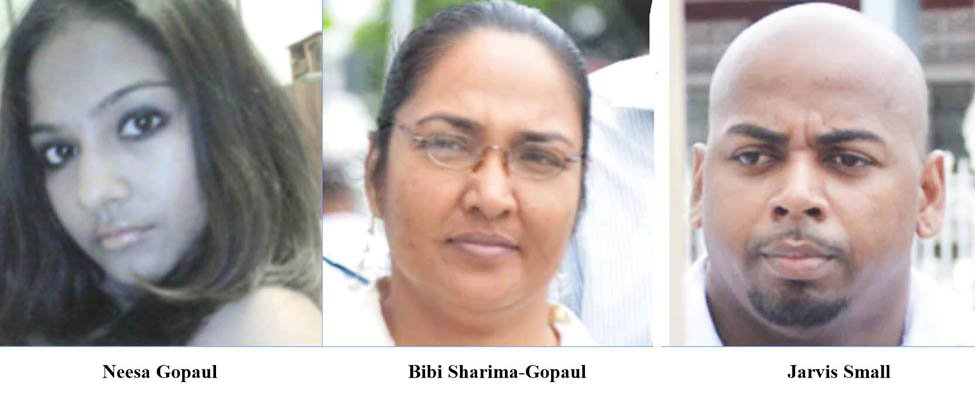Granted approval by the Caribbean Court of Justice (CCJ) to appeal her conviction and sentence for the murder of her 16-year-old daughter, Bibi Sharima-Gopaul recently lodged with the Court, the grounds on which she intends to mount her challenge.
She has complained primarily about the conduct of her High Court trial, at which she contends prejudicial evidence was led against her which ultimately resulted in a miscarriage of justice.
The Appellant is now hoping that the Trinidad-based court of last resort will reverse and/or set aside the judgment of the Guyana Court of Appeal which upheld her conviction.
Back in 2015, Sharima-Gopaul and her former partner and co-accused, Jarvis Small were both found guilty by a jury for the gruesome murder of her daughter—former Queen’s College student—Neesa Gopaul whose battered decomposing remains were found on October 2nd, 2010, stuffed in a suitcase that was dumped in a creek at the Emerald Tower resort.
Trial Judge Navindra Singh had sentenced Sharima-Gopaul to106-years in jail, and Small, to 96-years. They would subsequently appeal their convictions and sentences.
Last August, the Guyana Court of Appeal upheld the convictions; though it reduced both their sentences to 45 years each.
Noting her dissatisfaction with the entire judgment, Sharima-Gopaul argues that the local appellate court erred in law in failing to find that the trial judge failed to adequately direct and/or warn the jury about the “danger of acting on the evidence of [her] cell mate.”
In the absence of such warning/direction, she argues through her attorney Arudranauth Gossai, that “the conviction could not be sustained.”
Further, the Appellant contends that the Court of Appeal erred in its finding that “the justice of the case required the admission of highly prejudicial evidence” against her; and erred also in its application of Section 13 of the Court of Appeal Act when it found that “no substantial miscarriage of justice actually occurred.”
Sharima-Gopaul also contends that the local appellate court erred in not following the sentence prescribed by Section 100A (1) (b) of the Criminal Law Offences Act, to utilize a starting-point of 15 years.
The Appellant complains further that the Court erred in refusing to deduct the five years she spent in pre-trial custody.
She is now hoping that the CCJ would reverse and/or set aside the judgment of the Guyana Court of Appeal and grant an order quashing her conviction and sentence.
In the alternative, she is seeking an order reducing the 45-year sentence the local Court of Appeal has imposed on her.
In granting Sharima-Gopaul leave to appeal, the CCJ had stated in a notice, “AND UPON CONSIDERING that there is a realistic possibility that a serious miscarriage of justice may have occurred, that genuinely disputable points of law of public importance have been raised and that the issues and points raised on behalf of the Applicant appear to be arguable and, in the interests of justice, ought to be fully ventilated at a hearing AND HAVING REGARD to Rule 9.7(c) of the Caribbean Court of Justice (Appellate Jurisdiction) Rules, 2021 IT IS ORDERED THAT: The Applicant be granted special leave to appeal.”
In its end of year report released on December 29th last, the Chambers of the Director of Public Prosecutions (DPP) indicated that Small has since lodged an appeal before the CCJ, also challenging his conviction and sentence.
Following his conviction back in 2015, Small had appealed, arguing like Sharima-Gopaul, that Justice Singh committed several errors during the trial, including the admittance of evidence that was prejudicial and failing to properly direct the jury.
Delivering the ruling of the Guyana Court of Appeal, however, acting Chancellor Yonette Cummings-Edwards had said the Court found “no substantial miscarriage of justice,” thereby only reducing the sentences, but affirming the convictions.
At the trial, the High Court had heard that Neesa had made several police reports of Small sexually assaulting her.
Pathologist Dr. Nehaul Singh, who performed the autopsy on the teen’s body, had testified that she was missing 50% of her head and that the multiple blunt trauma that caused her death had been forcefully inflicted.
She was said to have been clobbered to the extent that her head appeared bashed in.
Neesa’s killing had sparked protests from several non-governmental organisations which had said that the “system had failed her.”
Main prosecution witness Simone Diane De Nobrega, who was a former cellmate of Sharima-Gopaul, said Sharima-Gopaul had confided in her that it was Small who murdered her daughter by bashing her head in with a piece of wood.
De Nobrega had said that Sharima-Gopaul related to her that Small told her that they needed to get Neesa “out of the picture” and that he eventually killed the teen in her presence.
The witness had told the court that despite her assurance to Sharima-Gopaul, she would not have been able to live with herself if she had kept such a secret. She said as a mother herself of two sons, “I couldn’t carry such a weight.” The woman added, “Neesa deserved to get justice and no matter what, Neesa didn’t deserve to die by the hands of someone she trusted; someone that was supposed to protect her.”





